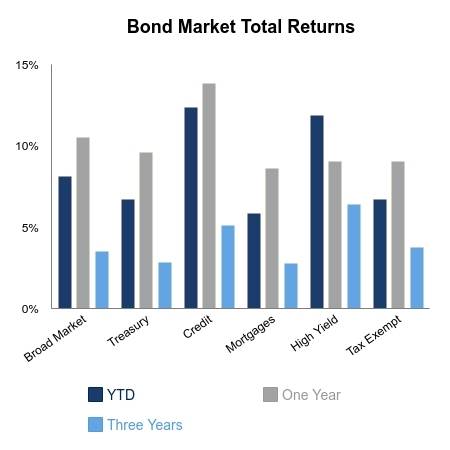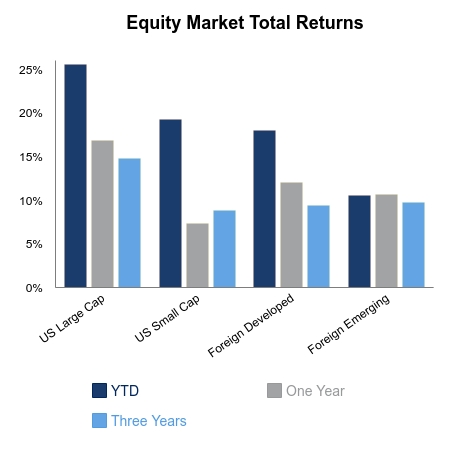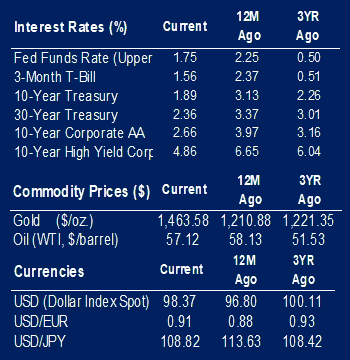We’ve approached the end of yet another earnings season. Currently, 92% of S&P 500 companies have reported earnings and sales for the third quarter. This season’s report shows financial results for U.S. companies are better than earlier expected. According to Refinitiv, of the companies reporting, earnings have contracted by 0.4%, which is 4.5% better than expected. Sales growth continued in the third quarter, with an expansion of 3.8%, better by 0.9% than expected. This growth in earnings and sales was led by the Health Care and Utilities sectors. The worst performing sectors this quarter have been Energy and Materials. We are seeing an improvement in revisions for the coming quarters as analyst optimism increases.
Consumer credit took a dip in the third quarter with $9.5 billion in credit extended to consumers. This is substantially lower than the previous month’s $17.8 billion and the expected $15 billion. The lower than expected number could suggest consumers are using more cash than usual. Consumer credit excludes loans secured by real estate, however, includes revolving credit and non-revolving credit. Revolving credit, like credit card debt, can be used repeatedly; while non-revolving credit, like auto loans, cannot be used after having been paid off. Revolving credit increased by 2.25% over the period and non-revolving credit increased by 6%.
We see continued growth in wages in excess of inflation. Year-over-year, October hourly earnings grew by 3%. This is in-line with the previous month’s number and the expectation. We expect even greater growth in wages with such a tight job market.
While the official Federal Reserve measure of inflation is the Personal Consumption Expenditure (PCE) number, the Consumer Price Index (CPI) has often been used as another measure of inflation. Year-over-year, CPI increased by 1.8% in October, which is slightly higher than the previous month’s and the expected 1.7%. Meaning, inflation has remained low relative to historical numbers. Month-over-month, CPI grew by 0.4%. Core CPI, which excludes food and energy, was at 2.3% year-over-year, which is a little lower than the expected and previous month’s 2.4%. Month-over-month, core CPI grew 0.20%.
Consumer optimism remains high as measured by the Michigan Sentiment Indicator. This month, the reading for the Index is at 95.7, which compares with the previous month’s 95.5 and the expected 96. Additionally, we see continued strength in small business optimism. The NFIB Small Business Index October reading was 102.4, which is better than the previous month’s high reading of 101.8.
 |
 |

Contributed by | Kuuku Saah, CFA, Investment Analyst
Kuuku is an Investment Analyst at BTC Capital Management with nine years of investment management experience. Kuuku’s primary responsibilities include portfolio management and analysis. Kuuku attended Drake University and double-majored in finance and economics. He is a holder of the right to use the Chartered Financial Analyst® designation.
Source: BTC Capital Management, Bloomberg LP, Ibbotson Associates, FactSet.
The information provided has been obtained from sources deemed reliable, but BTC Capital Management and its affiliates cannot guarantee accuracy. Past performance is not a guarantee of future returns. Performance over periods exceeding 12 months has been annualized.
The information within this document is for information purposes only and is not intended as an offer or solicitation with respect to the purchase or sale of any security. Statements in this report are based on the views of BTC Capital Management and on information available at the time this report was prepared. Rates are subject to change based on market and/or other conditions without notice. This commentary contains no investment recommendations and you should not interpret the statement in this report as investment, tax, legal, and/or financial planning advice. All investments involved risk, including the possible loss of principal. Investments are not FDIC insured and may lose value.

